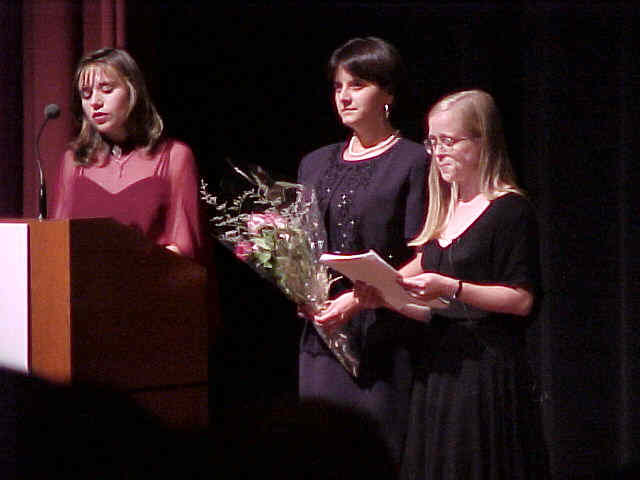
On October 1 and again November 9, Colombian human rights advocates have been honored in Washington, D.C., for their efforts in the face of escalating persecution. First, the international award of the Letelier-Moffitt Human Rights Award (given in memory of former Chilean foreign minister Orlando Letelier and Institute for Policy Studies researcher Ronni Karpen Moffitt, assassinated upon orders from Pinochet in Washington on September 21, 1976) went to the Coordinación Colombia-Europa, a coalition of over 50 Colombian human rights organizations formed to coordinate international work. The Coordinación designated Gloria Herney Galíndez, president of the Association of Relatives of the Disappeared (ASFADDES), to receive the Award; also present from Coordinación member organizations were Rafael Barrios of the Colectivo de Abogados, Carlos Rodríguez from the Colombian Commission of Jurists, Jael Quiroga of Reiniciar, in addition to Olga Gutiérrez, Secretary of the Coordinación Colombia-Europa.

Gloria Herney Galíndez and Olga Gutiérrez at the Letelier-Moffit Awards ceremony
On November 9 the Robert F. Kennedy Human Rights Award was given to four Colombian human rights activists: Jaime Prieto of the Comité de Solidaridad con los Presos Políticos, Mario Humberto Calixto of the Sabana de Torres Human Rights Committee, and Gloria Flórez and Berenice Celeyta of MINGA.
Gloria Inés Flórez Schneider and Berenice Celeyta Alayon are leaders of the Association for Alternative Social Policy (MINGA), an organization that provides human rights education and training materials to local human rights organizations. It also collects and provides to international human rights organizations information about abuses committed by paramilitary groups, guerrillas and the military. Ms. Flórez emphasized the increasingly dangerous life of Colombian human rights defenders and the importance of human rights "defenders throughout the world in favor of the defense of human rights in Colombia as they allow human rights efforts to continue in Colombia. "We also share this prize with these organizations." "In the last two years, some 20 human rights defenders have been killed, more than 15 have left the country, and a number of local human rights committees have suspended their activities."
"On June 16, 1997, one month after the murder of CINEP researchers Mario Calderón and Elsa Alvarado, ..., nongovernmental organizations presented the Colombian state with a proposal to prevent attacks and provide effective protection to human rights defenders."... "No serious measure along these lines has been adopted, and the risks to those carrying out human rights work continue."
Ms. Celeyta focused on the topic of forced displacement, a form of violence experienced by over one million Colombians, that "causes the rupturing of the nuclear family and social groups and tears the social and cultural fabric." She noted that the "displacements occur in areas that are particularly important economically and geopolitically—regions that have abundant natural resources like oil and gold."
Mario Humberto Calixto is a teacher and president of the Sabana de Torres Human Rights Committee, which operates in one of the most violent regions of Colombia. The Committee collects information on human rights violations that have occurred during Colombia's civil war, including disappearances, killings and massacres. It also offers legal assistance to victims, their families and people displaced from their homes by violence. He explained that since 1992, the people of the municipality of Sabana de Torres and the city of Barrancabermeja have increasingly suffered from violence: "Terror, fear and anxiety are the daily bread of the people of Sabana de Torres. Today there is no human rights committee to receive their complaints of abuses and violations committed by actors in the armed conflict. Forced to shut down, its committee members are being persecuted."
Jaime Prieto Méndez has worked for 23 years with the Committee in Solidarity with Political Prisoners, an organization that defends the rights of political detainees. In his acceptance speech, Mr. Prieto addressed the violent political repression and the tragedy of civilians as victims of the armed conflict. He emphasized that a political solution to the armed conflict must be found, and that respect for human rights is necessary to do so. He also noted: "the crisis has often gone unnoticed by the international community, despite its horrifying statistics of extrajudicial executions, massacres forced disappearances, torture and arbitrary detention, all documented by a variety of international institutions." He urged the U.S. and other governments to encourage a favorable climate for peace talks and to observe, monitor, and oversee the human rights situation and the behavior of the involved actors.
For more background information, you can visit the web site of the Robert F. Kennedy Memorial at www.rfkmemorial.org.
See the speeches of the laureates.
Berenice
Celeyta
Gloria
Flórez
Jaime
Prieto
Mario
Calixto